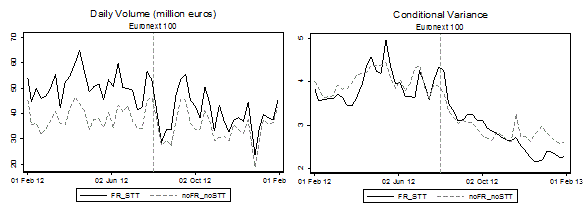| Author Name | Gunther CAPELLE-BLANCARD (Université Paris 1 Panthéon-Sorbonne / CEPII) / HAVRYLCHYK, Olena (Visiting Scholar, RIETI) |
|---|---|
| Download / Links |
This Non Technical Summary does not constitute part of the above-captioned Discussion Paper but has been prepared for the purpose of providing a bold outline of the paper, based on findings from the analysis for the paper and focusing primarily on their implications for policy. For details of the analysis, read the captioned Discussion Paper. Views expressed in this Non Technical Summary are solely those of the individual author(s), and do not necessarily represent the views of the Research Institute of Economy, Trade and Industry (RIETI).
Is it possible to design a tax on financial transactions to curb speculative activity and render financial markets more stable? Or will additional taxation of financial transactions hurt market liquidity and increase market volatility? The introduction of the securities transaction tax (STT) increases the cost of trading and decreases market volume, but its impact on market volatility is ambiguous, because it depends on whether rational or irrational investors leave the market.
In this paper, we study the impact of the transaction tax introduction in France, which has the second biggest stock market in Europe, in 2012. The French case is interesting because of the unique design of the French tax. As the tax is levied only on large French firms, this allows us to compare the impact of the tax introduction relative to two control groups: smaller French firms and foreign firms also listed on Euronext. Such comparison is important, because it allows us to isolate the impact of the tax from any other economic shock that has impacted all listed firms during the analyzed period.
Our results in Figure 1 show that the introduction of the STT has reduced the market volume of French stocks that are subject to the tax relative to the control group that consists of foreign firms, but there was no heterogeneous impact on volatility. The analysis of volatility stresses the importance of relying on a control group, because volatility of all stocks has declined during the analyzed period, and if a control group did not exist, this decline would be attributed to the tax introduction.
Overall, our investigation shows that STT is neither a panacea nor a "madness." It does not decrease market volatility by curbing speculative activity, but, at the same time, there is no detrimental effect on market volatility. Hence, in the global debate about taxation of the financial sector, empirical evidence supports the idea that STT is more of a revenue-focused tax than a corrective tax.
Figure: Impact of the STT introduction on stock market volume and volatility
These figures present weekly un-weighted average for French firms subject to the tax (FR_STT) and a control group that consists of foreign firms traded on the Euronext that are not subject to the tax (noFR_noSTT). Daily Volumei,t = Number of shares traded for the stock i on day t * Pi,t where Pi,t is the closing price for the stock i on the day t. Conditional variancei,t is estimated with a GARCH(1,1).
Source: Datastream and authors' calculations


 [Click to enlarge]
[Click to enlarge]